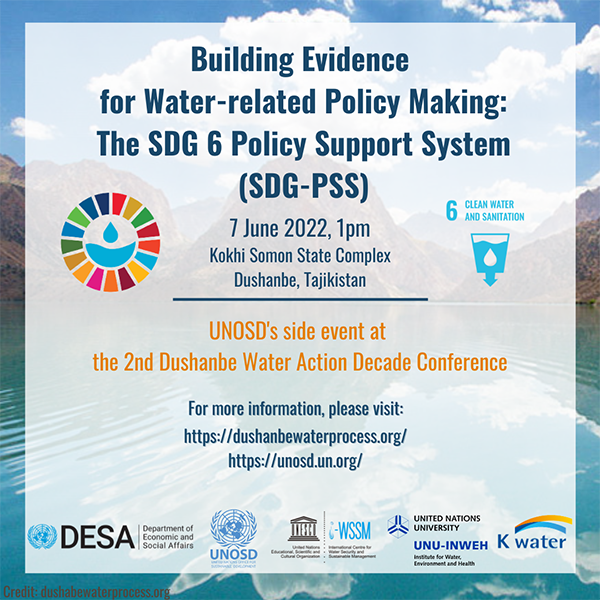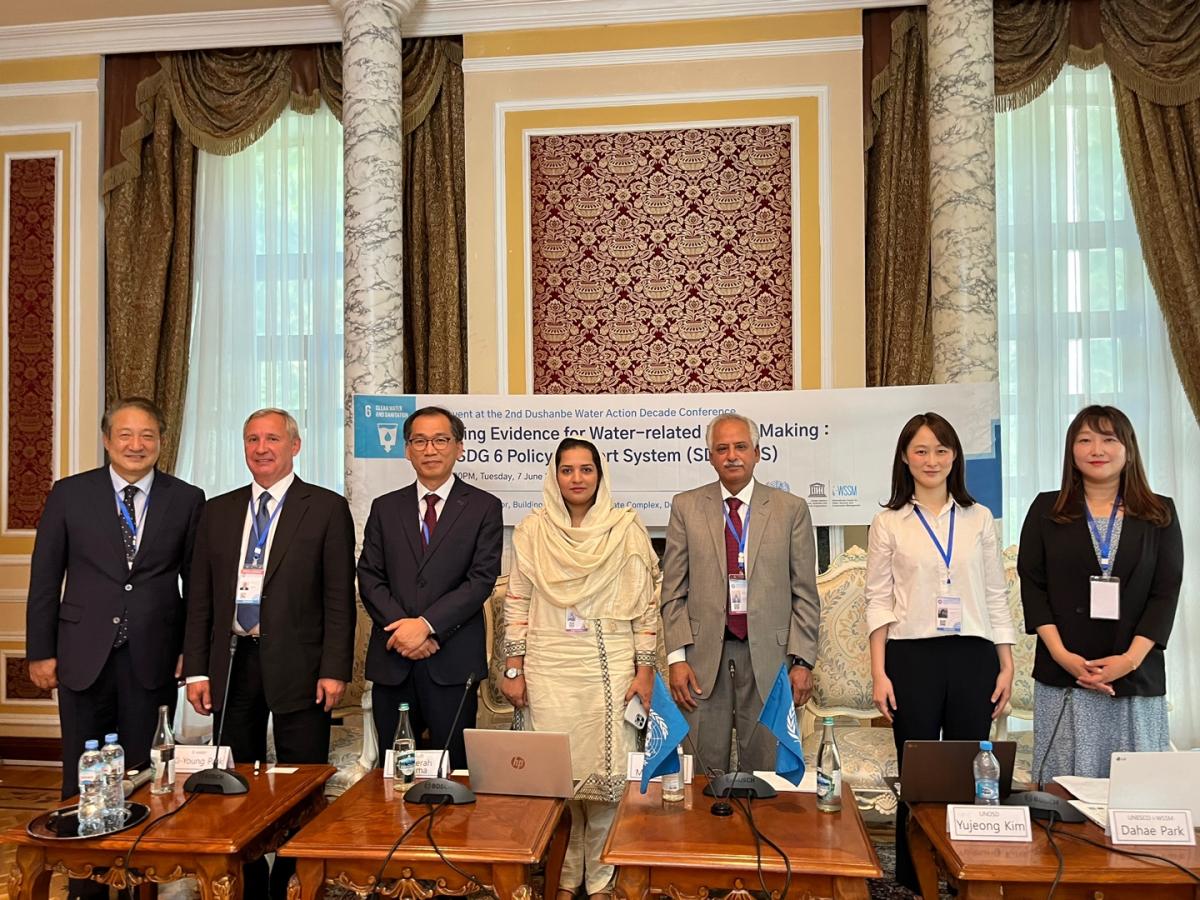[2022] Side Event at the 2nd Dushanbe Water Action Decade Conference

Description
After seven years into the implementation of the 2030 Agenda for Sustainable Development and its Sustainable Development Goals (SDGs) adopted in 2015, the world is still off track in achieving many goals according to the latest assessment on SDGs . In terms of SDG 6 ‘Ensuring availability and sustainable management of water and sanitation for all’, billions of people still lack access to safe drinking water, sanitation and hygiene. 129 Countries are not on track to have sustainably managed water resources by 2030. Achieving SDG 6 plays a key role in accelerating implementation of the other water-related SDGs, as water is, by default, a cross-cutting dimension of social, environmental, and economic development. In the wake of the COVID-19, access to safe water supply and sanitation has become even more evident as an essential element of human life.
Ongoing water-related challenges coupled with the current pandemic urge governments to assess their capacities for water management and address weaknesses with structured policy based on reliable evidence. In many UN member states, particularly in low and middle-income countries, there is a lack of data - missing, fragmented and even conflicting - regarding water and sanitation that support policy and decision making. Collaborative evidence-based approaches need to be prioritized while engaging with water experts and development actors to collect critical data and evidence on the enabling environments of SDG 6.
To address the need for policy actions under limited data conditions, the United Nations Office for Sustainable Development (UNOSD) and the United Nations University Institute for Water, Environment and Health (UNU-INWEH) in collaboration with the Ministry of Environment of Republic of Korea (MOE) and the Korea Environment Corporation (K-eco) have developed a web-based tool named “SDG 6 Policy Support System (SDG-PSS)” that offers a platform for multisectoral experts to cooperate and analyze collaboratively data regarding water and sanitation. This tool was designed to generate evidence on the enabling environment of SDG 6 through a framework that shows strengths and weaknesses and missing data across all SDG 6 targets and indicators. The critical components of SDG-PSS include: Capacity Assessment; Finance; Policy and Institutional Assessment; Gender Mainstreaming; Disaster Risk Reduction (DRR)/Resilience Mainstreaming; and Integrity. Water professionals and policy makers can use SDG-PSS to translate trends and estimates into collaborative planning to develop, implement and measure the effectiveness of water-related policies while addressing national level SDG 6 targets. Government officials and water experts from the hub countries of the project including Tunisia, Pakistan and Brazil have been actively involved in the creation and implementation of SDG-PSS.
As part of “Water Action Decade” (2018-2028), the 2nd Dushanbe Water Action Decade Conference, co-chaired by the Prime Minister of the Republic of Tajikistan and the Under-Secretary-General of the United Nations, is expected to provide a platform for water-related policy dialogue, partnership, and action at the global, regional, national level. Some of the main focus of the Conference will be on promoting science-based solutions and tools, including data, technologies, and innovations; improving capacity building, knowledge and education through sharing information and best practices; showcasing successful partnerships, advocacy and networking actions by stakeholders at all levels; and strengthening cooperation at different levels by promoting dialogue, partnership and cross-sectoral approaches.
This serves as the perfect backdrop of this side event organized by UNOSD, together with the new project partner UNESCO International Centre for Water Security and Sustainable Management (UNESCO i-WSSM), which will serve as a platform to showcase the SDG-PSS and to share the experiences of the hub-countries in using SDG-PSS as a powerful tool for supporting evidence-based policy and decision making to achieve SDG 6. Please visit https://dushanbewaterprocess.org/ for detailed information on the 2nd Dushanbe Water Action Decade Conference.

Official Documents and Reading Materials
Concept Note (updated as of 4 June 2022)
SDG 6 Policy Support System: An explanatory handbook driven by user experience for understanding and application of PSS - Pakistan (Government of Pakistan, PCRWR & UNU-INWEH)
Recording (Youtube)
https://www.youtube.com/watch?v=ErXAaCEAs8A
Format, Date & Time
The side event will be held on Tuesday, 7 June 2022 from 1:00pm to 2:30pm (GMT+5) at Fireplace Hall, 1st floor, Building B at the Kokhi Somon State Complex, Dushanbe, Tajikistan. The side event will be held in a hybrid-format (in-person and online zoom) to promote highest level of interaction between speakers and audience.
Objectives
This side-event at 2nd International Conference in Dushanbe aims to:
- Enhance awareness of the importance of evidence-based policy making in achieving SDG 6;
- Increase knowledge of participants on the SDG-PSS and how the tool can be used to produce evidence on water-related policy making;
- Share and discuss experiences, best practices, and lessons learned of the hub-countries in using SDG-PSS on implementing SDG 6; and
- Showcase the partnership between the partner organizations and hub-countries.
Programme and Agenda
Opening Remarks:
- H.E. Mr. Liu Zhenmin, Under-Secretary-General, United Nations Department of Economic and Social Affairs (UN DESA) - Remarks delivered by Mr. Alexander Trepelkov, Acting Director, Division for Sustainable Development Goals, UN DESA
- Mr. Chun Kyoo Park, Head of Office, UNOSD
Presentations
- Importance of Evidence based policy making for water security and sustainable development
- Ms. Dahae Park, Senior Programme Specialist, UNESCO i-WSSM
- Introduction of SDG 6 Policy Support System (SDG-PSS)
- Ms. Yujeong Kim, Senior Sustainable Development Officer, UNOSD
- Experiences in using SDG-PSS in Pakistan
- Mr. Ashraf Muhammad, Chairman of Pakistan Council of Research in Water Resources
- Ms. Bareerah Fatima, Deputy Director Pakistan Council of Research in Water Resources
- Experiences in using SDG-PSS in Tunisia (video message)
- Ms. Olfa Mahjoub, Head of Chemistry Laboratory for Water-Soil-Biosolids, National Research Institute for Rural Engineering, Water and Forestry
- Integrated Water Resources Management of the Republic of Korea
- Mr. Ki-young Park, Director of Global Cooperation Department, Korea Water Resources Corporation (K-Water)
Open Discussion
- Moderator: Ms. Chaela Shin, Associate Research Policy Development Expert, UNOSD
Organizers
This side event is co-organized by the United Nations Office for Sustainable Development (UNOSD) of the UN Department of Economic and Social Affairs (UN DESA), and UNESCO International Centre for Water Security and Sustainable Management (UNESCO i-WSSM).
Photos
The photos of the event can be found HERE

